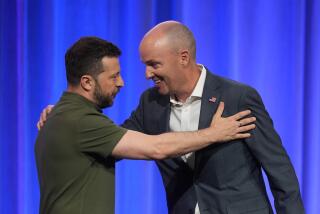Nixon Urges Japan to Show Leadership, Step Up Aid to Russia
- Share via
Not long after basking in the spotlight as the elder statesman who coached President Clinton on Russia policy, Richard Nixon had some free advice Wednesday for Japan: Demonstrate a little global leadership by giving more economic aid to your old Cold War foe.
At a conference here on U.S.-Japan relations sponsored by the Nixon Library, the former President admonished Tokyo to transcend its dispute with Russia over four small islands. Japan should act more generously to support President Boris N. Yeltsin’s economic reforms, promoting geopolitical stability in the process, he said.
“When it hosts the Group of Seven meeting in Tokyo in July, Japan should boost its role in providing economic aid to Russia,” Nixon told a lunchtime audience at the Biltmore Hotel.
Japan announced a $1.8-billion bilateral aid package for Russia last week at a G-7 ministerial meeting. But Washington has been pressuring Japan and other allies to ante up contributions to a multilateral aid package for Moscow, now totaling $43.4 billion.
“Japan is an economic superpower, and it is going to and should play a greater role on the world stage,” Nixon said. Greater effort in Japan’s foreign aid program is the best means of exerting influence in international affairs, he said, because military power would “cause consternation” among the Asian countries that Japan victimized in World War II.
Nixon’s appearance at the conference had more of the aura of a political pep rally than a foreign policy forum. Gov. Pete Wilson introduced him, and there were plenty of nostalgic references to Nixon’s own role on the world stage before he resigned the presidency in disgrace in 1974 at the climax of the Watergate scandal.
The former President, now 80, cut an impressive figure delivering his remarks to the hushed audience without the aid of a prepared text. Although the conference was focused on Japan and Nixon had recently returned from a two-week trip to Asia, his chief interest appeared to be the Russian cause.
“We should treat Russia today not as a defeated enemy, but as an ally and a friend who joined with us to defeat communism,” Nixon said, noting that the Russians dismantled the old Soviet apparatus.
The Clinton Administration’s awkward, early attempts to formulate a coherent Japan policy dominated discussions by other participants in the two-day conference, which was ambitiously titled “Fragile Friendship: U.S.-Japan relations and the balance of power in the post-Cold War era.”
Former Secretary of State Henry A. Kissinger set the tone Tuesday night by criticizing Clinton’s confrontational stance in his meeting last Friday with Prime Minister Kiichi Miyazawa.
“The reception could have been more friendly, diplomatically warmer,” Yasuo Tanabe, a ranking official with Japan’s Ministry of International Trade and Industry, said in an interview. “But for us the discussion was OK, even though I’m not so sure about the style.”
Derek Shearer, deputy undersecretary for economic affairs at the Commerce Department, betrayed the confusion within the ranks of Clinton’s economic team by admitting that he personally opposes the macroeconomic strategy, apparently endorsed by other leading Clinton advisers, of forcing down the value of the dollar to make U.S. exports cheaper and thus help correct the ballooning bilateral trade gap.
More to Read
Sign up for Essential California
The most important California stories and recommendations in your inbox every morning.
You may occasionally receive promotional content from the Los Angeles Times.













